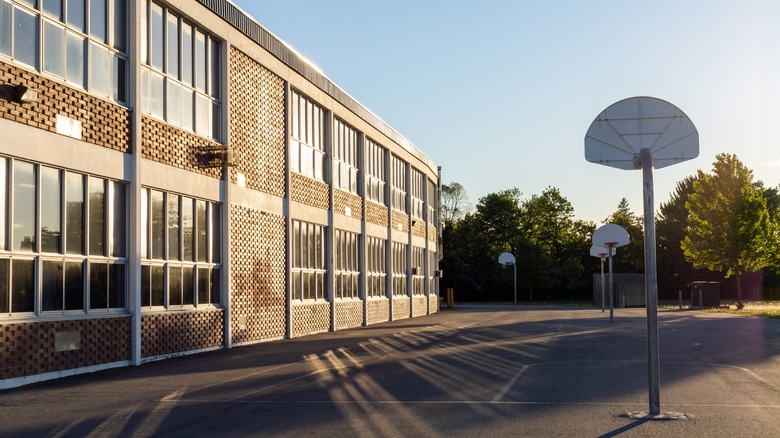Liminal Spaces And The Uncomfortable Kind Of Familiarity
You know the movie scene by now: someone, likely a hapless soon-to-be-victim, steps into a room that just feels ... off. The person can't put a finger on it, but proceeds lightly, gingerly, breathing heavily and peering around at nothing that can be seen, but waits nonetheless. Or for the urban explorers in the crowd, this is similar to the type of profoundly eerie and disturbing sensation of walking into an abandoned space. The space was crafted for life but contains none. These scenarios go far in describing a phenomenon as difficult to explain as it inscrutable in its origins: liminal spaces.
Different sites and sources describe liminal spaces in different ways. The website Liminal Space defines it as "the time between the 'what was' and 'the next.'" Very Well Mind takes this to mean a space of physical transition, like a hallway, stairwell, airport terminal, etc., that connects places. A person never stays in these spaces, but only travels through them as a temporary bridge. Liminal Space (the website) quotes Franciscan priest Richard Rohr's more symbolic interpretation, saying, "There alone is our old world left behind, while we are not yet sure of the new existence. That's a good space where genuine newness can begin." The Atlantic, in the vein of this article's opening horror-and-apocalypse descriptions, states that liminal space is as uncomfortable as it is familiar, especially if it's meant for people but is now empty. And in a post-pandemic world, such thoughts ring especially true.
The uncanny valley of spaces
The Liminal Space Reddit sub-thread has some excellent pictures of liminal spaces: ferries with no passengers, uninhabited rooms furnished with old-timey furniture, emptied residential streets, architecture that's oddly symmetrical, bizarrely placed doors and rooms, etc. There's something sad and surreal about these photos, and undeniably off-putting.
It can be hard to pinpoint why such photos are off-putting. IFL Science points out that sensations of discomfort might have to do with what's been coined "the uncanny valley" effect. The uncanny valley is the sense of repugnance felt when encountering something close to human but not quite, or close to real but not quite. Anyone who's ever been creeped out by a mannequin, for example, should have no problem understanding this experience. Mannequins look human enough in general form but aren't convincingly human enough to not seem creepy. Similarly, some people feel disturbed by the herky-jerky, obviously artificial appearance of rubber-skinned androids like the semi-famous Sophia, whom Tech Xplore discusses. An artificial construct like Data from "Star Trek: The Generation," on the other hand, doesn't evoke those kinds of responses because he comes across as truly human.
Liminal spaces produce the same kind of response for the same reason. Unused shopping malls and abandoned hospitals are close enough to real, like mannequins, but not real enough. They're more like movie sets than lived-in places full of normal activity. In this way, as The Atlantic describes, liminal spaces are familiar but uncomfortable. Or put differently, they're comfortable places made unfamiliar.
A time of transition
Anyone who's gone through a rough patch (or several) might be familiar with another interpretation of liminal spaces: a time of symbolic life transition. As Very Well Mind describes, a liminal space in life might be something like a divorce, experiencing the death of a loved one, or going through a difficult illness while spending time in a hospital. Or think of moving to a new home or school. Maybe the move was abrupt, maybe not. Maybe you felt prepared, but still feel jarred by the change. Maybe it felt odd to be walking on new streets or driving new roads but following a schedule similar to the old one. The sensation of discomfort, disconnection, dissociation, etc., is another way to define a liminal space. You're not settled yet, but kind of temporarily stuck and waiting with no fixed home or sense of being grounded.
As Liminal Space describes — and as those who've experienced such transitions likely know — many take such symbolic liminal spaces as necessary for personal growth. It's true that without such forms of stress, strife, or pressure, many people wouldn't feel incentivized to move forward in life or make progress that suits them; it's just too easy to maintain the status quo. Such interpretations of liminal spaces might come across as a stretch, especially if one chiefly takes liminal spaces to mean creepy pictures of abandoned malls, but there's still clear value to be had in such metaphorical observations.
Nostalgia for the old days
Liminal spaces have come up more and more recently in online circles and forums like Reddit thanks to the very tool that allows such conversations: the internet. Think about several generations ago, when people didn't have to contend with the endless recordkeeping that the internet affords. There was a life event that happened maybe when someone was 6 years old, or 15 years old, etc., and then it was gone. Memory faded and the event transformed into a hazy tale told to relatives, children, or friends. Nowadays, folks have about 20,000 pictures of the time they went off to college, for instance, displayed in crisp megapixeled clarity and never fading year after year.
When looking at such pictures, or even environments from younger years like video game arcades now left abandoned, it can evoke a weird uncanny valley feeling that intermingles with a term that's come to suffuse discussions amongst those who grew up in the 1980s, '90s, and so on: nostalgia (as sites like IFL Science discuss). In other words, digital recordkeeping makes it clear that every single phase of life, in a broader sense, is transitional. Over a long enough period of time nothing is permanent, and what was is gone forever. A simple photo can make it clear that life itself, with all its interspersed transitions, is just one prolonged liminal space. This is how critical physical environments — whether a playground, a mall, or an old living room — are to life.



